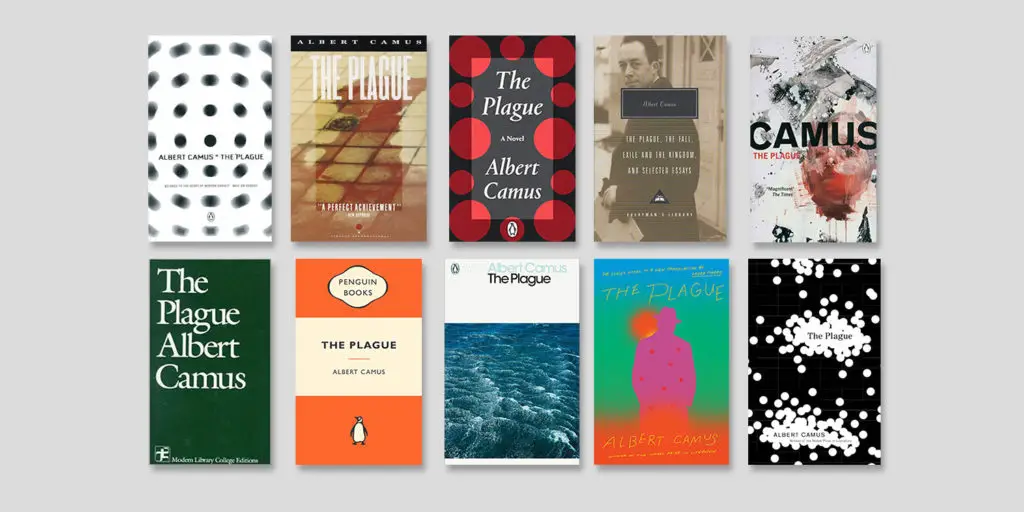“I want to read the best English translation of The Plague!”
So you’re trying to make sense of the global pandemic and you want to read a book about another type of plague.
You’re not alone.
The COVID-19 coronavirus epidemic has boosted this classic back to the top of the bestseller lists.
- The Guardian: “Albert Camus novel The Plague leads surge of pestilence fiction”
Catherine Camus (the author’s daughter), says “If there’s a passage in the book that speaks to readers, that gives them hope, this is what is important.” - Boston Review: “Reading Camus in Time of Plague and Polarization”
“The world that Camus paints in The Plague may appear bleak. In reality, the novel is a testament to hope, resistance, and humanity.” - Vol. 1 Brooklyn: “Translating The Plague During a Pandemic: An Interview with Laura Marris” by Kevin Canfield
“I was immersed in this world of this historical plague—and I too didn’t quite believe that I really lived in that world, physically, in my real life. But it turns out everything that’s happened in history can happen to us.” - The New York Times: “Camus’s Innoculation Against Hate” by Laura Marris
“I still hope that books from the past can be a kind of serum for the future, as Camus intended his novel to be. He knew that his book would be needed again, long after his death, in a context he couldn’t predict or imagine. ”
The Plague: Translation History
There are three English translations of The Plague by Albert Camus, the philosophical modern French classic that tells the story of a fictional deadly epidemic in the Algerian city of Oran. It was originally published in French in 1947 with the title La Peste.
See below for excerpts and links that will help you do a comparison of translations of The Plague.
Do you want a particular format?
Which translation is “best” for you might depend on the formats in which it is available.
If you want an ebook or paperback, there are copies available from Gilbert, Buss, and Marris.
If you want a hardcover, you can choose between Gilbert and Marris.
If you want an audiobook, the only choice seems to be Gilbert.
Can I get a FREE ebook of The Plague?
No. There are no legitimate, good-quality ebooks of The Plague available for free.
The Plague and other works by Camus are still under copyright in some places but not others, so the book sharks are posting cheap, lousy ebooks on Amazon.
Speaking of which… what is it with people putting an alligator on the cover? I’ve seen no less than three different versions with alligators! Or crocodiles, I can’t really tell. Neither creature lives where the story is set. Also stay away from that monstrosity featuring a guy with a bandaged head. It’s a rough transcription of the Gilbert translation.
Who Was Stuart Gilbert?
He was an English literary scholar, a fan and friend of James Joyce, and a translator into English of some well-known French authors.
It seems twenty-first century readers find fault with his translations for being insufficiently modern and too loose. That we’re fussier about accuracy than we used to be and we don’t talk like we did decades ago is hardly Gilbert’s fault, but it may mean we read his work less, now that we have alternatives.
About the Gilbert translation of The Plague
The New York Times: “The pleasures and perils of creative translation”
A meditation on the experience of reading several works translated from French to English, including examples of artistic license in Gilbert’s version of The Stranger by Camus. “Translators take fewer liberties nowadays.”
Translation Review: “Stuart Gilbert’s The Plague: Paraphrase or Translation?” by Peter Carpenter
This journal article concludes that it’s a paraphrase. And these days, not necessarily a very readable paraphrase.
“A translation… cannot only be assessed on the basis of its readability, although this is obviously an important consideration. It must also be looked at in terms of its faithfulness to the original…. Now the question is: has Gilbert faithfully conveyed to English-speaking readers what Camus wrote in his great novel, La Peste?1 The answer will be based on the argument that, despite the readability of Gilbert’s work, in the final analysis it is more a paraphrase than a translation.” According to Carpenter, the minor problems of Gilbert’s translation include “archaic words and expressions” that “get in the way of the modern reader’s understanding” and omissions of phrases, sentences, and even a whole paragraph. More significant are several inaccurate translations. Worse is Gilbert’s tendency to embroider, ornament, and adorn or elaborate and explain the text he was translating, thus reducing “the power of Camus’ economical style.” Examples pervade the text. Also lamented is Gilbert’s failure to use appropriately poetic language.
London Review of Books: “Pointing the Finger”
This article and several rounds of responses highlight the issues one encounters when trying to create or critique a translation. Mentions translations by both Gilbert and Buss.
Bibliomane Blog: “The Plague, by Albert Camus: A Review” by Bill Bibliomane
Bill Bibliomane (who has some French skills) says “there were many instances where I felt let down by the Gilbert translation.”
Los Angeles Review of Books: “More to Admire: On Laura Marris’s Translation of Albert Camus’s The Plague” by Robert Zaretsky
“Confident he was amplifying Camus’s language and meaning, Gilbert instead often altered them beyond recognition…. Gilbert never fails to replace clarity with clutter. Where there were shouts, there is now the waxing of massive waves; where there were fireworks there are now cataracts of colored fire; and where there was the decision to tell a story, there is now the decision to compile a chronicle. Where there wasn’t darkness, now there is. More importantly, where there were commas, there are now semicolons and colons, turning the passage’s spare yet lyrical clauses into a series of didactic bullet points. What was spare now sprawls, and what was simple now staggers.”
Extract from the Gilbert translation of The Plague:
The unusual events described in this chronicle occurred in 194- at Oran. Everyone agreed that considering their somewhat extraordinary character, they were out of place there. For its ordinariness is what strikes one first about the town of Oran, which is merely a large French port on the Algerian coast, headquarters of the prefect of a French department.
The town itself, let us admit, is ugly. It has a smug, placid air and you need time to discover what it is that makes it different from so many business centers in other parts of the world. How to conjure up a picture, for instance, of a town without pigeons, without any trees or gardens, where you never hear the beat of wings or the rustle of leaves—a thoroughly negative place, in short? The seasons are discriminated only in the sky. All that tells you of spring’s coming is the feel of the air, or the baskets of flowers brought in from the suburbs by peddlers; it’s a spring cried in the marketplaces. During the summer the sun bakes the houses bone-dry, sprinkles our walls with grayish dust, and you have no option but to survive those days of fire indoors, behind closed shutters. In autumn, on the other hand, we have deluges of mud. Only winter brings really pleasant weather.
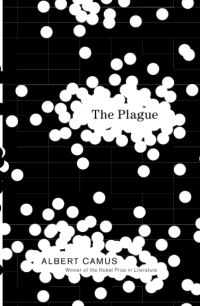
Get the Vintage Gilbert translation of The Plague
It contains the translated text in five parts. Nothing else is included, except a list of books by Camus and a brief bio. The stark black-and-white cover design by Helen Yentus is pretty cool. It’s one of a matching set of nine Camus book covers.
Available as a paperback (ISBN 9780679720218, 320 pages).
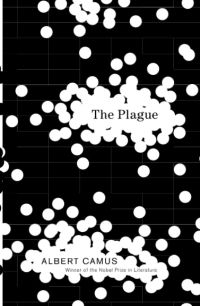
Get the Vintage Gilbert translation of The Plague
It contains the translated text in five parts. Nothing else is included, except a list of books by Camus and a brief bio. The stark black-and-white cover design by Helen Yentus is pretty cool. It’s one of a matching set of nine Camus book covers.
Available as an ebook (ISBN 9780307827807).

Get the Recorded Books Gilbert translation of The Plague
Read by James Jenner.
Available as an audiobook.
Who was Robin Buss?
He was a British writer, film critic, polyglot, and translator with a PhD in French Literature. His translations from French include:
- The Count of Monte Cristo by Alexandre Dumas
- Under Fire by Henri Barbusse
- The Fall by Albert Camus
- Therese Raquin by Emile Zola
- The Princesse de Cleves by Madame de La Fayette
- On Suicide by Emile Durkheim
- Cesar Birotteau by Honore de Balzac
You might want to read his 2006 obituary in The Independent.
About the Buss translation of The Plague
- There isn’t much said in favor of the Robin Buss translation, which is surprising; where it’s mentioned at all it is quoted to point out the shortcomings of the Gilbert translation.
- An edited version of an introduction by Tony Judt (which appeared in my copy as an afterword) is online at The Guardian, “A hero for our times”.
Extract from the Buss translation of The Plague:
The peculiar events that are the subject of this history occurred in 194-, in Oran. The general opinion was that they were misplaced there, since they deviated somewhat from the ordinary. At first sight, indeed, Oran is an ordinary town, nothing more than a French Prefecture on the coast of Algeria.
It has to be said that the town itself is ugly. Its appearance is calm and it takes some time to appreciate what makes it different from so many other trading ports all over the world. How can one convey, for example, the idea of a town without pigeons, without trees or gardens, where you hear no beating of wings or rustling of leaves, in short, a neutral place? The change of season can only be detected in the sky. Spring declares itself solely in the quality of the air or the little baskets of flowers that street-sellers bring in from the suburbs; this is a spring that is sold in the market-place. In summer the sun burns the dried-out houses and covers their walls with grey powder; at such times one can no longer live except behind closed shutters. In autumn, on the contrary, there are inundations of mud. Fine weather arrives only with winter.
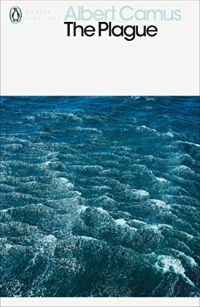
Get the Penguin Modern Classics Buss translation of The Plague
It contains the text of the Buss translation in five parts and an afterword by Tony Judt. There are several other works by Camus available with this type of cover design.
Available as a paperback (ISBN 9780141185132, 256 pages).
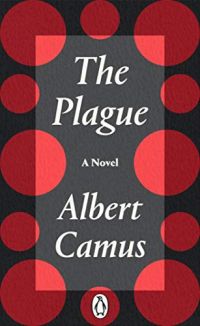
Get the Penguin Modern Classics Buss translation of The Plague
It contains the text of the Buss translation in five parts. I’m not sure whether this one has the Tony Judt afterword. There are a few works by Camus available with this type of cover design.
Available as a paperback (ISBN 9780241458877, 368 pages).

Get the Penguin Modern Classics Buss translation of The Plague
It contains the text of the Buss translation in five parts. I’m not sure whether this one has the Tony Judt afterword. There are a few works by Camus available with this type of cover design.
Available as an ebook.
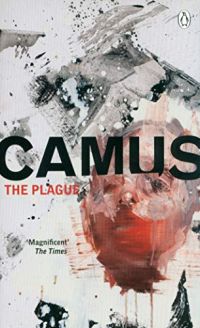
Get the Penguin Essentials Buss translation of The Plague
Personally I can’t stand this “Penguin Essentials #102” cover… I’m not sure whether it has the Tony Judt afterword.
Available as a paperback (ISBN 9780141049236, 304 pages).
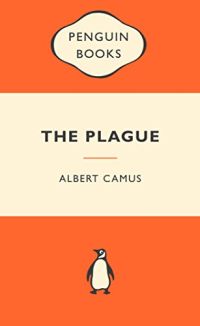
Get the Popular Penguins Buss translation of The Plague
Available as a paperback (ISBN 9780141045511, 264 pages).
“Who is Laura Marris?”
She is an American writer, poet, and translator. She teaches creative writing at the University of Buffalo.
She was already working on her translation of The Plague when the pandemic hit. Now she is working on a book of essays titled States of Plague: Reading Albert Camus in a Pandemic.
About the Marris translation of The Plague
Los Angeles Review of Books: “More to Admire: On Laura Marris’s Translation of Albert Camus’s The Plague” by Robert Zaretsky
“[W]e can finally read the work as Camus meant it to be read. Laura Marris’s new translation of The Plague is, quite simply, the translation we need to have…. Her finished work is a marvel of clarity and poetry…. Marris gives us a work of simplicity that does not rewrite, but instead reveals the original text, as true to Camus’s meaning as to his means of expressing it. The work, in short, is marked no less by ethical than by artistic integrity.”
Vol. 1 Brooklyn: “Translating The Plague During a Pandemic: An Interview with Laura Marris” by Kevin Canfield
Marris said: “One of the ways that I tried to differentiate myself from Gilbert has to do with how he puts his own emotional response to those moments of restraint on the page. For instance, where Camus says, They got back to work—the French is very simple—Gilbert will be like, They put their shoulders to the wheel again. You can really feel Gilbert’s emotion at that moment—it’s a very moving moment. But I think it’s important for me in those moments to hold back my own feelings, so that the reader can make that emotional leap for themselves…. I love those moments where Camus turns to the sky. This was something that really attracted me during the quarantine. Camus can be so immersed in a horrible scene, something that is just heartrending—someone is dying on the operating table, treatments have failed. And then he’ll switch gears and just have a moment where the doctor goes outside and sits on a bench; he looks at the sky and he talks about the clouds. To me those were little markers of grief—tiny memorials in poetic language. And because it’s the sky, it’s a place that’s visible to everyone.”
Reading in Translation: “A Plague for Our Times: Albert Camus’ The Plague, translated from French by Laura Marris” by Andrew Martino
“Marris’ translation is lush and beautifully executed…. What struck me particularly about Marris’ translation is her ability to breathe new life into the text without sacrificing the spirit of the original.”
Yale Daily News: “Translating, teaching and reading Caums’ ‘The Plague’ during Covid-19” by Carrie Zhou
“According to Marris, the novel’s allegorical interpretation often obscures the text’s depictions of illness and the city of Oran. In her translation, she hopes to bring attention to the story’s physical spaces.”
Hopscotch Translation: “Translating The Plague and the Sky” by Heather Green
Marris traveled to Oran, the city in Algeria where the novel is set. “For me, it was very important to understand the actual sites of the book—the city walls, the old plague cemeteries from the settler-colonial era, the streets the characters traverse.” Marris doesn’t find retranslating much different from translating: “I will always look at other translations if they exist, but usually just when I find a particularly strange or confounding moment in the text. If I’ve agreed to translate a book, it’s because I have a strong sense of how it should sound. I’m never going to imagine exactly the same voice and imagery as the previous translators. But it’s like having long-distance colleagues, and asking how they solved a particular puzzle. There was one moment in The Plague about a particular kind of 1940s steam heater in a train station. I’ve never seen one in my life, but Stuart Gilbert probably had.” Does Marris find the delights of translation sustaining? “It’s a privilege to go to my desk and make these choices about the weight of a metaphor, the capturing of a thought. Even in the darkest times, I find language sustaining.”
Extract from the Marris translation of The Plague
The curious events that make up this chronicle occurred in 194_, in Oran. By all accounts, they had no place there, being a bit out of the ordinary. At first glance, Oran is, in fact, an ordinary town and nothing more than a French prefecture on the Algerian coast.
The city itself is undeniably ugly. Through the outward calm, it can take some time to notice what sets this commercial city apart from so many others along every latitude. How to picture, for example, a city without pigeons, without trees and gardens, where you encounter neither the beating of wings nor the rustling of leaves, in short, a neutral space? The changing seasons are only visible in the sky. Spring announces itself by the quality of the air or by the baskets of flowers the peddlers bring from the surrounding areas; this spring is hawked at market. In summer, the sun scorches the too-dry houses and covers the walls with gray ash; then you can only survive in the shade of closed shutters. In fall, it’s the opposite, a deluge of mud. The fine days come only in winter.
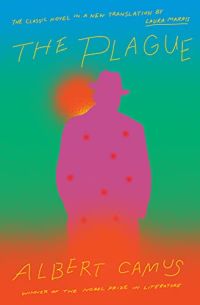
Get the Knopf Marris translation of The Plague
At the end, this translation contains a translator's note and a note about the author.
Available as a hardcover (ISBN 9780593318669, 352 pages).
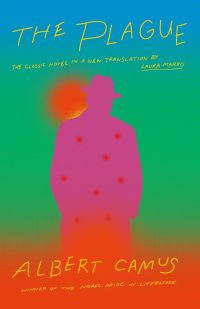
Get the Vintage Marris translation of The Plague
At the end, this translation contains a translator's note and a note about the author.
Available as a paperback (ISBN 9780593082096, 352 pages).
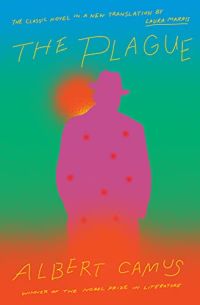
Get the Knopf Marris translation of The Plague
At the end, this translation contains a translator's note and a note about the author.
Available as an ebook (ISBN 9780593318676).
The Best Translation of The Plague by Camus
I know some French—but not, like, a lot—and I haven’t read both the existing English translations. Still, you asked, so here’s my answer.
I recommend the Buss / Penguin translation of The Plague.
- It’s the one I read. I also read the Robin Buss translation of The Count of Monte Cristo. No complaints.
- The Buss / Penguin edition of The Plague has a nice afterword by Tony Judt; as far as I know, the Gilbert / Vintage edition doesn’t have any special frontmatter or backmatter.
- Various sources indicate that the Gilbert translation, being older, paraphrases more than the Buss translation.
Will the Marris translation supersede the previous translations?
- No translation is perfect; presumably the Marris translation will be said to have made corrections and improvements. Otherwise why would there be a new translation?
- Some people cling to whichever translation they read first because that translator’s voice sounds like the author’s voice to them, even though it’s not; some find that a more recent translation makes the text much more readable and enjoyable than it had been previously.
Psst! It’s not just a book about an epidemic…
The book can be read on the surface level as the story about a town in lockdown, but while the depiction is convincing, I’m pretty sure the author meant his readers to look deeper. The afterword by Tony Judt in my copy of The Plague says the book is a subtle but unmistakable allegory of wartime German occupation of France.
However, the specific danger that the characters face and the historical context in which the book’s audience originally read it don’t matter so much. What matters is the quiet, inner struggle of souls grappling with the eternal Problem of Evil. Why do bad things happen to good people, and how should we react?
A book review from 1948 says “The argument extends beyond the physical impact of the plague into metaphysical terrain” and calls the novel “a work of considerable significance and stature.”
In other words, like any good novel, The Plague has something to say to all people in all times and places.

